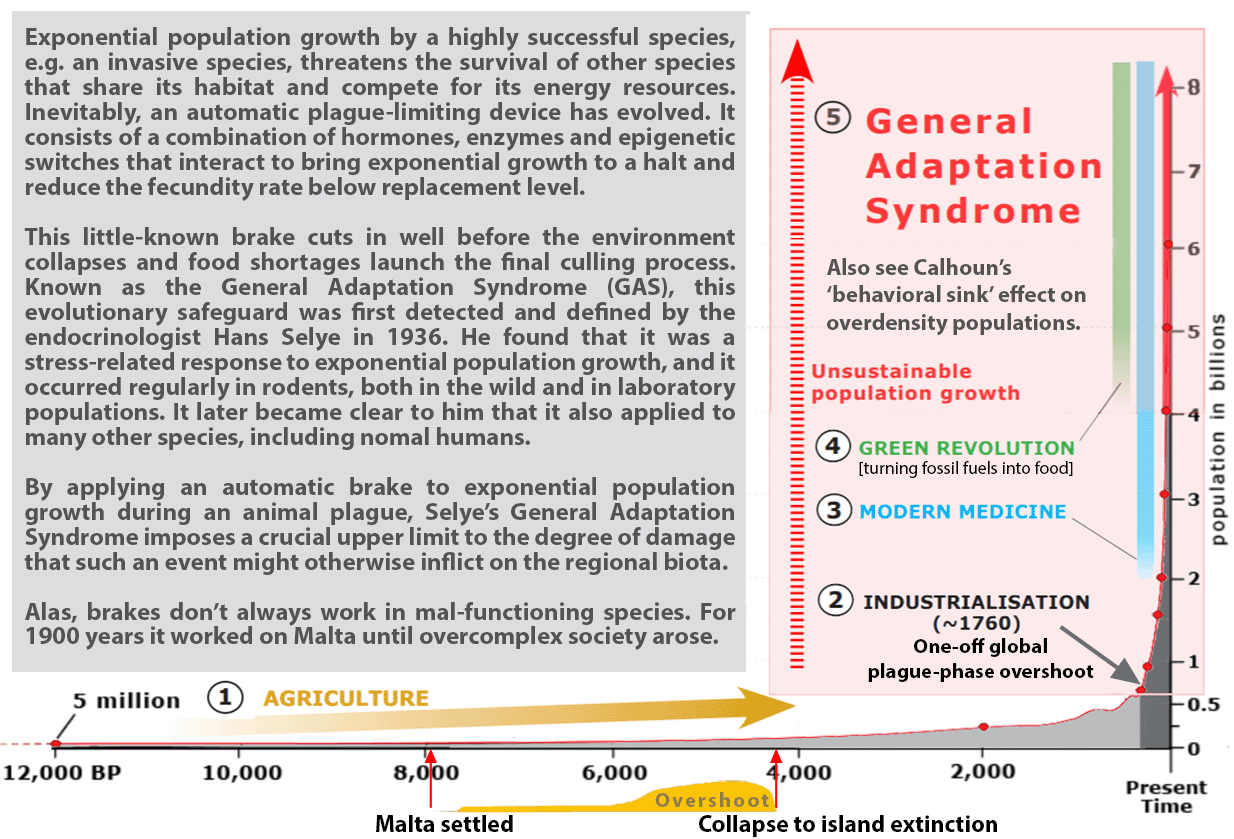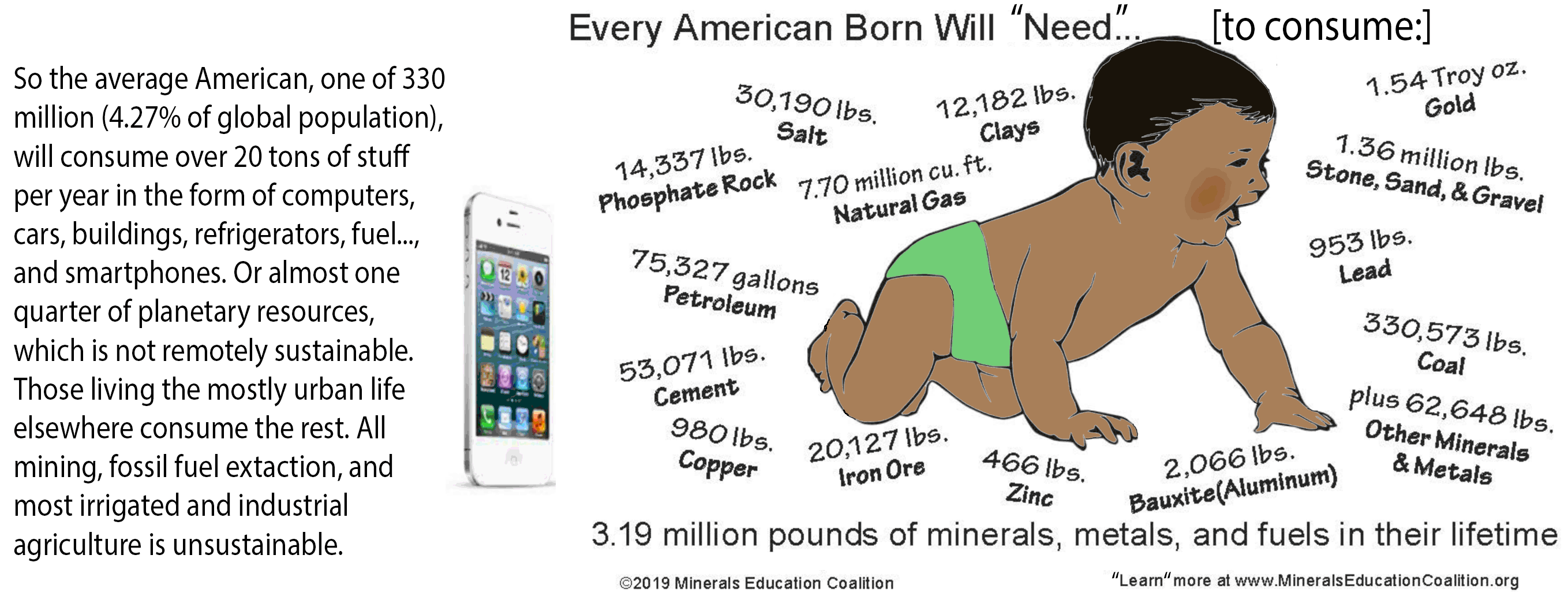
THURSDAY, APR 21, 2022: NOTE TO FILE

Our Ghastly Future
Posterity's and those who live long enough
Eric Lee, A-SOCIATED PRESS
"With the coinage of 'sustainable development', the defenders of the unsteady state have won a few more years' moratorium from the painful process of thinking."
— Garrett Hardin
TOPICS: ENOUGH, FROM THE WIRES, TOO MUCH, NOT ENOUGH
Intro: In 1987 we were offered a story of Our Common Future where sustainable development would grow the economy at 5 percent (or more) to eliminate poverty, hunger, provide good health, well-being, and a quality education for all; create gender equality, clean water, sanitation, and affordable clean energy too cheap to meter. Everyone would have decent work serving the growing economies of the world. Industry, innovation and infrastructure would flourish. Inequalities would be reduced, sustainable cities and communities will grow and prosper, as will responsible consumption and production. Climate action will be forthcoming. Life below water will thrive swimmingly as will life on land. There will be peace, justice and strong institutions (corporations, governments, military-industrial complexes, NGOs, centers of modern techno-industrial education...). All stakeholders, on this our planet for the taking, will form partnerships and goals to ensure our common future is the one humans want NOW!
COOS BAY (A-P) — 'Sustainable development' is the consensus narrative all right thinking humans agreed to in 1987. So 34 years pass and in 2021 humanity is offered a different message, one about our having underestimated the challenges of avoiding a ghastly future. Not good news for 10 year olds, it seems. Sorry about that. Thanks to the Wayforward Machine, posterity sent us a message.
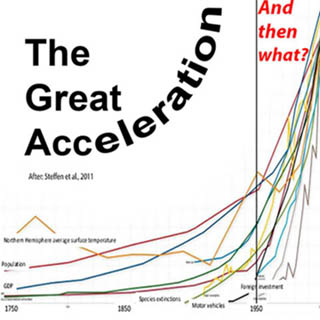 Of course anyone paying attention in 1950, who noticed the Great Acceleration (and understood the exponential function, maybe some fraction of 1 percent of scientists) could foresee posterity's ghastly future (if not to the decade). The relevant concept (from ecology) is 'extinction debt' [or overshoot debt: imagine an island of rabbits and a few clever foxes arrive: one invents an infallible rabbit killing machine and for a time the foxes are fruitful and multiply until the last rabbit, their only food source, is killed so the one fox who has room to eat another does; all celebrate their exceptionalism, their dominion over the island (and then pay their debt by starving to death because all were too clever by half and not nearly smart enough to have foresight intelligence — as the one vixen had who was shunned as a 'doomer', refused to partake of industrial rabbit production, and had been killed as a poacher before the last rabbit was eaten)].
Of course anyone paying attention in 1950, who noticed the Great Acceleration (and understood the exponential function, maybe some fraction of 1 percent of scientists) could foresee posterity's ghastly future (if not to the decade). The relevant concept (from ecology) is 'extinction debt' [or overshoot debt: imagine an island of rabbits and a few clever foxes arrive: one invents an infallible rabbit killing machine and for a time the foxes are fruitful and multiply until the last rabbit, their only food source, is killed so the one fox who has room to eat another does; all celebrate their exceptionalism, their dominion over the island (and then pay their debt by starving to death because all were too clever by half and not nearly smart enough to have foresight intelligence — as the one vixen had who was shunned as a 'doomer', refused to partake of industrial rabbit production, and had been killed as a poacher before the last rabbit was eaten)].
Empire building culture selects for foxes who know many things, but only for a time. As Archilochus suggested, a viable civilization needs to select for hedgehogs who know one big thing. 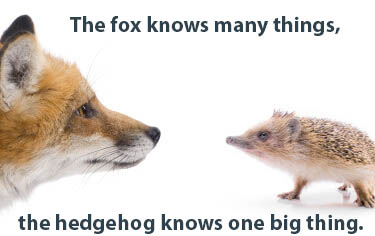 'Ecologists, in my opinion [Garrett Hardin], are hedgehogs. The one big thing they know is this: "We can never do merely one thing." This simple sentence imperfectly mirrors the one big thing ecologists know—the idea of a system... It's tough to be a hedgehog. You take a simple little idea—the right one, you hope—and "thinking on't constantly" (as Newton said) you discover it has wide and unexpected ramifications. In the variety and disunity so cherished by foxes the hedgehog finds a unity, knit together by his one big idea. Being the first to feel its power, and alone with his thought, it is not surprising if he doubts his sanity. Darwin, his mind big with the idea of natural selection, suffered grave self-doubts. Writing to a fellow naturalist just after the publication of the Origin of Species he confessed, "When I think of the many cases of men who have studied one subject for many years, and have persuaded themselves of the truth of the foolistest doctrines, I feel sometimes a little frightened, whether I may not be one of these monomaniacs." '— Garrett Hardin, Exploring New Ethics for Survival: The Voyage of the Spaceship Beagle, 1972. [Addressed to foxes, who prosper and proliferate during the exuberance of growth and exploitation for its own sake phase, to whom all hedgehogs look like monomaniacs.]
'Ecologists, in my opinion [Garrett Hardin], are hedgehogs. The one big thing they know is this: "We can never do merely one thing." This simple sentence imperfectly mirrors the one big thing ecologists know—the idea of a system... It's tough to be a hedgehog. You take a simple little idea—the right one, you hope—and "thinking on't constantly" (as Newton said) you discover it has wide and unexpected ramifications. In the variety and disunity so cherished by foxes the hedgehog finds a unity, knit together by his one big idea. Being the first to feel its power, and alone with his thought, it is not surprising if he doubts his sanity. Darwin, his mind big with the idea of natural selection, suffered grave self-doubts. Writing to a fellow naturalist just after the publication of the Origin of Species he confessed, "When I think of the many cases of men who have studied one subject for many years, and have persuaded themselves of the truth of the foolistest doctrines, I feel sometimes a little frightened, whether I may not be one of these monomaniacs." '— Garrett Hardin, Exploring New Ethics for Survival: The Voyage of the Spaceship Beagle, 1972. [Addressed to foxes, who prosper and proliferate during the exuberance of growth and exploitation for its own sake phase, to whom all hedgehogs look like monomaniacs.]
As for the 2021 warning to humanity (another of about a hundred and counting), read Underestimating the Challenges of Avoiding a Ghastly Future. Or, as Steve Salmony (see comments on prior link) would (for posterity's sake), boil it down to one paragraph bounded by two sentences. Oh, but the middle paragraph is in academic speak with too many references and too many words for the modern human attention span, so what if the boiled down version is simmered longer with spices added (but not sugar-coated)? In seven paragraphs (565 words) and six info-graphics:
The science underlying our existential concerns for humanity and the biosphere is strong, but humanity's grasp on reality is fragile. Our failure to understand our predicament or consider real solutions has our failure to persist as outcome (as modern techno-industrial society or as a species).
As a population of normal animals (K-strategists) approaches its environmental carrying capacity, individuals experience stress and respond adaptively by reducing their fertility rate (General Adaptation Syndrome) to avoid overshooting the upper carrying capacity boundary. This is how humans lived for 375k years (and hominins for over 6 million years, and...).
But for most of history (last 7k years), human ingenuity (i.e. energy/technology) has temporarily inflated the natural environment's carrying capacity for us by unsustainably overexploiting arable lands and forests to overproduce food (thanks to slaves/serfs/draft animals working the livelong day) and wood (embodied energy) to maximize population so as to be more likely to conquer than be conquered (the last 7k years of human history has been a history of empire building).
[While graduates of today's medical schools swear oaths, none repeat Hippocrates' oath that begins with a pledge to pagan deities. A new tradition is for each graduating class to make up their own consensus oath to take (with dissenters mumbling other words). None of them, including dissenters, mention the only idea that matters in the long run, i.e. that any life saved/extended must be equaled by preventing/delaying one birth, otherwise carrying capacity will be exceeded, environments degraded, extinctions multiplied (perhaps human extinction included), and posterity will incur an overshoot debt those in the future will pay. If in the next hundred years, billions die of conflict/starvation/plague/stress/polution/crime/suicide/overdose..., then among others (e.g. agronomists, sanitation workers, industrialists, 'leaders'), posterity will have doctors to blame for failing to consider them in their oaths, resulting in their lamentable die-off. Doctors, scientists, academics, our 'best and brightest' will come to be seen as too clever by half and not nearly smart enough.]
"Imagine the average person. Now consider that half of all humans are even dumber. Then imagine a room full of the smartest humans on the planet in it. Now consider that they are not nearly smart enough."
Human population dynamics is essentially similar to, not different from, the population dynamics of other species. The belief that humans are different in kind from other organisms is not evidence-based. FOR A TIME (≈300 years) humans have been able to, in effect, turn fossil fuels into food (in England, origin of the Industrial Revolution, the Newcomen coal powered steam engine pumped water from a flooding coal mine in 1712, and the 5.5 million population of 1700 increased to over 9 million by 1800). Food is still hyper-abundant today, but current food production, transport, processing, and modes of consumption (e.g. fast food drive-throughs) are not remotely sustainable.
For a time, humans can continue to deplete a planetary larder of fossil fuels and other resources for the taking while adding over 80 million more human consumers each year to expand humanity's boot stomping on the face of Gaia (but not forever, only for a time).
A growing human population, all of whom want to consume more per capita, will predictably lead to greater competition (warfare) for an ever-dwindling resource pool. Scarcity induced conflict increases scarcity in a downward death spiral to see who will inherit the rubble (it won't matter who, sorry about that). The corollaries are many, but the outcome is the continued destruction of a planetary life-support system that all lifeforms (e.g. humans) depend on. The predominant paradigm is still one of putting the 'economy' (stupid) over the 'environment' (as externality humans are decoupling from). In reality, the choice is between a managed rapid depopulation and economic contraction within pockets of potential sustainability or rapid chaotic collapse for all as usual (e.g. Indus Valley Civilization, but this time on a global scale, think Late Bronze Age Collapse, Sea People and Land People, writ large).
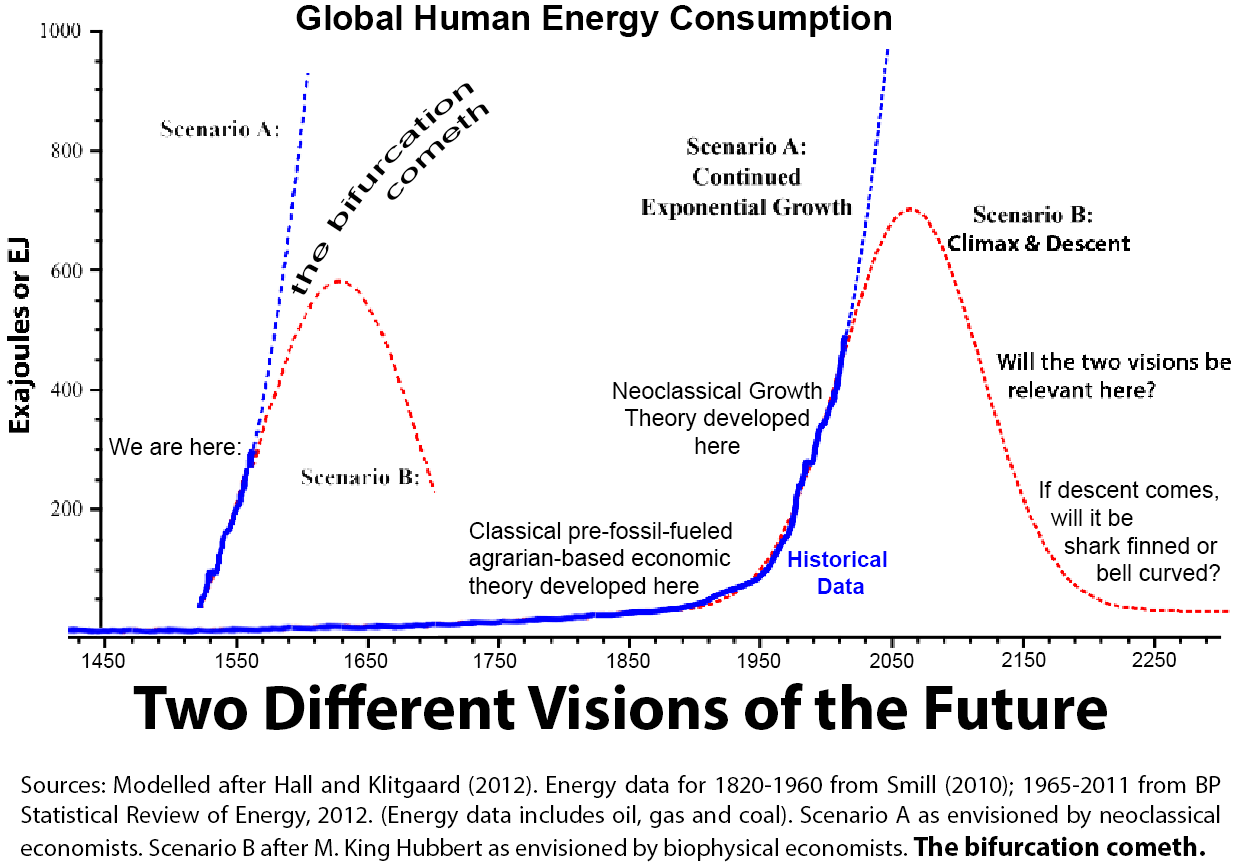
It is therefore incumbent on experts in any discipline that deals with the future of the biosphere and human well-being to eschew reticence, avoid sugar-coating the overwhelming challenges ahead and 'tell it like it is'. Anything else is misleading at best, or negligent and potentially lethal for the human enterprise at worst.
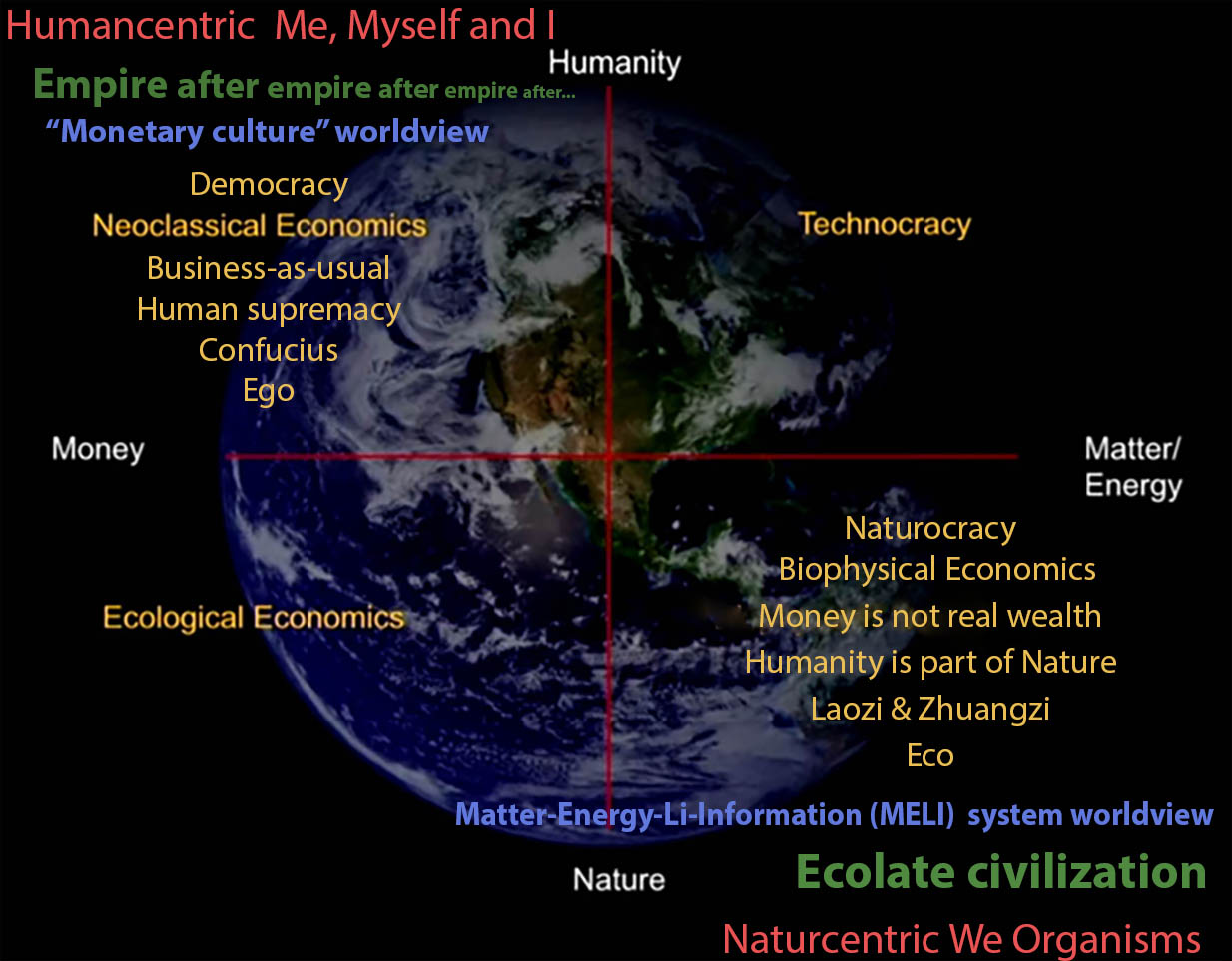
Adapted from Mark Brown, Beyond Growth: Economics as if the Planet Mattered, 2/5/2019.
'Monetary culture] vs matter-energy system worldview. —M. King Hubbert
'Li' is Chinese for the laws—organizing principles of the cosmos.
Technocracy and ecological economics were/are transitional.

